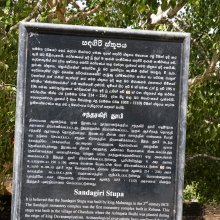Svakiya, Svakīya: 16 definitions
Introduction:
Svakiya means something in Hinduism, Sanskrit, Marathi, Hindi. If you want to know the exact meaning, history, etymology or English translation of this term then check out the descriptions on this page. Add your comment or reference to a book if you want to contribute to this summary article.
Alternative spellings of this word include Swakiy.
Images (photo gallery)
In Hinduism
Natyashastra (theatrics and dramaturgy)
Source: Shodhganga: The significance of the mūla-beras (natya)Svakīya (स्वकीय) or Svīya refers to a “heroine of good character” and represents one of the three kinds of “heroines” (nāyikā) in a dramatic representation, according to the Abhinaya-sara-samputa, as used within the classical tradition of Indian dance and performance, also known as Bharatanatyam.—In the depiction of any mood or sentiment, a dance performance or a dramatic representation takes the medium of the hero (nāyaka) and the heroine (nāyikā). The nāyikās (heroines) are generally classified into three types [viz., Svakīya].
The heroine is called svakīya when she possesses good character and is upright. She is again classified into three types:
- mugdha-nāyikā (tender, youthful, and young),
- madhya-nāyikā (an adolescent and partly experienced),
- pragalbha-nāyikā (very mature).
The mugdha, madhya and pragalbha-nāyikās are divided into three types depending on their relationship with the hero. They are: (1) jyeṣṭha (the older wife to the hero) and (2) kaniṣṭha (the younger wife to the hero).

Natyashastra (नाट्यशास्त्र, nāṭyaśāstra) refers to both the ancient Indian tradition (shastra) of performing arts, (natya—theatrics, drama, dance, music), as well as the name of a Sanskrit work dealing with these subjects. It also teaches the rules for composing Dramatic plays (nataka), construction and performance of Theater, and Poetic works (kavya).
Shaktism (Shakta philosophy)
Source: Brill: Śaivism and the Tantric Traditions (shaktism)Svakīya (स्वकीय) refers to “one’s own”, according to the King Vatsarāja’s Pūjāstuti called the Kāmasiddhistuti (also Vāmakeśvarīstuti), guiding one through the worship of the Goddess Nityā.—Accordingly, “[...] Any person who is hanging on to the ultimate [reality of yours] and wishes to perceive and measure your proportions with his [limited] mind, that man of perception smarter [than everyone] in this world evidently touches the shadow of his own head (svakīya-śiras) in a series of his own footsteps ”.

Shakta (शाक्त, śākta) or Shaktism (śāktism) represents a tradition of Hinduism where the Goddess (Devi) is revered and worshipped. Shakta literature includes a range of scriptures, including various Agamas and Tantras, although its roots may be traced back to the Vedas.
Purana and Itihasa (epic history)
Source: archive.org: Shiva Purana - English TranslationSvakīya (स्वकीय) refers to “one’s own family”, according to the Śivapurāṇa 2.3.30 (“The Celebration of Pārvatī’s Return”).—Accordingly, as Brahmā narrated to Nārada: “On hearing that Pārvatī was returning, Menā and Himavat excessively delighted went ahead seated in a divine vehicle. [...] Women near and dear as also the wives of her brothers (... [?] svakīya) embraced her closely with great pleasure.—‘A great task has been well accomplished by you. It has saved the whole family. All of us are sanctified by your noble conduct’.—Praising her with these and similar words they bowed to her with great delight. They worshipped her with sandal paste and sweet scented flowers in great joy. [...]”.

The Purana (पुराण, purāṇas) refers to Sanskrit literature preserving ancient India’s vast cultural history, including historical legends, religious ceremonies, various arts and sciences. The eighteen mahapuranas total over 400,000 shlokas (metrical couplets) and date to at least several centuries BCE.
Yoga (school of philosophy)
Source: ORA: Amanaska (king of all yogas): A Critical Edition and Annotated Translation by Jason BirchSvakīya (स्वकीय) refers to “one’s own”, according to the Parākhyatantra verse 14.8-9.—Accordingly, while discussing preliminary practices to make the Yogin ready to undertake the six auxiliaries of Śaiva yoga: “He should adopt one of these [four poses], placing his hands with the palms arranged [facing upwards] in his own lap (svakīya-aṅkagata), expanding his chest evenly. Slightly closing his two eyes, he should focus on the tip of his nose. Remaining thus he is fit for yoga and he should then begin its sequence”.

Yoga is originally considered a branch of Hindu philosophy (astika), but both ancient and modern Yoga combine the physical, mental and spiritual. Yoga teaches various physical techniques also known as āsanas (postures), used for various purposes (eg., meditation, contemplation, relaxation).
Languages of India and abroad
Marathi-English dictionary
Source: DDSA: The Molesworth Marathi and English Dictionarysvakīya (स्वकीय).—a (S) Own, proper, peculiar, belonging to self: also of one's own (family, kin &c.)
--- OR ---
svakīyā (स्वकीया).—f S One's own wife or mistress.
Source: DDSA: The Aryabhusan school dictionary, Marathi-Englishsvakīya (स्वकीय).—a Own, proper; of one's own.
--- OR ---
svakīyā (स्वकीया).—f One's own wife or mistress.
Marathi is an Indo-European language having over 70 million native speakers people in (predominantly) Maharashtra India. Marathi, like many other Indo-Aryan languages, evolved from early forms of Prakrit, which itself is a subset of Sanskrit, one of the most ancient languages of the world.
Sanskrit dictionary
Source: DDSA: The practical Sanskrit-English dictionarySvakīya (स्वकीय).—a.
1) One's own, own.
2) Of one's own family.
-yā One's own wife.
Source: Cologne Digital Sanskrit Dictionaries: Shabda-Sagara Sanskrit-English DictionarySvakīya (स्वकीय).—mfn.
(-yaḥ-yā-yaṃ) 1. Of one’s own family. 2. Own in general, as property, &c. E. sva own, cha aff., and kuk augment.
Source: Cologne Digital Sanskrit Dictionaries: Benfey Sanskrit-English DictionarySvakīya (स्वकीय).—i. e. svaka + īya, adj. 1. Own, [Pañcatantra] 187, 12; his, ib. 42, 2. 2. Of one’s own family.
Source: Cologne Digital Sanskrit Dictionaries: Cappeller Sanskrit-English DictionarySvakīya (स्वकीय).—(poss. refl.) one’s own; [masculine] [plural] relatives or friends.
Source: Cologne Digital Sanskrit Dictionaries: Monier-Williams Sanskrit-English Dictionary1) Svakīya (स्वकीय):—[from sva] mfn. = 1 sva, one’s own, own, proper, belonging to one’s self or family or people, [Mahābhārata; Kāvya literature] etc.
2) [v.s. ...] m. ([plural]) one’s own people, followers, friends, [Mahābhārata]
3) Svakīyā (स्वकीया):—[from svakīya > sva] f. one’s own wife, [Monier-Williams’ Sanskrit-English Dictionary]
Source: Cologne Digital Sanskrit Dictionaries: Yates Sanskrit-English DictionarySvakīya (स्वकीय):—[(yaḥ-yā-yaṃ) a.] Of one’s own family, own.
Source: DDSA: Paia-sadda-mahannavo; a comprehensive Prakrit Hindi dictionary (S)Svakīya (स्वकीय) in the Sanskrit language is related to the Prakrit word: Sakkia.
[Sanskrit to German]
Sanskrit, also spelled संस्कृतम् (saṃskṛtam), is an ancient language of India commonly seen as the grandmother of the Indo-European language family (even English!). Closely allied with Prakrit and Pali, Sanskrit is more exhaustive in both grammar and terms and has the most extensive collection of literature in the world, greatly surpassing its sister-languages Greek and Latin.
Hindi dictionary
Source: DDSA: A practical Hindi-English dictionary1) Svakīya (स्वकीय) [Also spelled swakiy]:—(a) own, one’s own, personal.
2) Svakīyā (स्वकीया) [Also spelled swakiya]:—(nm) (in Indian Poetics) a loyal heroine; wife.
...
Kannada-English dictionary
Source: Alar: Kannada-English corpusSvakīya (ಸ್ವಕೀಯ):—[adjective] of or belonging to oneself, one’s family or one’s kinsmen, etc.
--- OR ---
Svakīya (ಸ್ವಕೀಯ):—
1) [noun] that which belongs to oneself, one’s family or one’s kinsmen.
2) [noun] a very close relative; a kinsman.
Kannada is a Dravidian language (as opposed to the Indo-European language family) mainly spoken in the southwestern region of India.
See also (Relevant definitions)
Starts with: Svakiya-saciva, Svakiyadhara, Svakiyadharasamsthita, Svakiyakripa, Svakiyam, Svakiyatva, Svakiye.
Ends with: Asvakiya.
Full-text (+5): Sakkia, Svakiyam, Asvakiya, Kushalartha, Svakiyatva, Swakiya, Sakiya, Swakiy, Vasateya, Tanuvaka, Parakiya, Parkiya, Sviya, Abhyakaram, Yathasthita, Saga, Mugdha, Pragalbha, Madhya, Ankagata.
Relevant text
Search found 20 books and stories containing Svakiya, Svakīya, Svakīyā; (plurals include: Svakiyas, Svakīyas, Svakīyās). You can also click to the full overview containing English textual excerpts. Below are direct links for the most relevant articles:
Hanuman Nataka (critical study) (by Nurima Yeasmin)
9.9. The character of Sītā < [Chapter 4]
Garga Samhita (English) (by Danavir Goswami)
Verse 4.7.6 < [Chapter 7 - The Story of the Ayodhya Women]
Chaitanya Bhagavata (by Bhumipati Dāsa)
Verse 2.19.43 < [Chapter 19 - The Lord’s Pastimes in Advaita’s House]
Bhakti-rasamrta-sindhu (by Śrīla Rūpa Gosvāmī)
Verse 4.5.31 < [Part 5 - Anger (raudra-rasa)]
Rig Veda (translation and commentary) (by H. H. Wilson)
Srila Gurudeva (The Supreme Treasure) (by Swami Bhaktivedanta Madhava Maharaja)
Difference between Aiśvarya and Mādhurya < [Chapter 2.12 - Early ISKCON Conversations with Śrīla Gurudeva]
Talking with the Learned Scholar Vaṃśaropaṇa Siṃha < [Chapter 1.5 - Back to Home Village]

